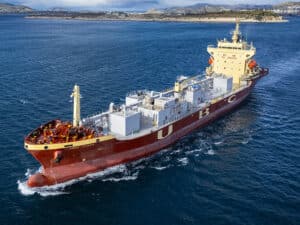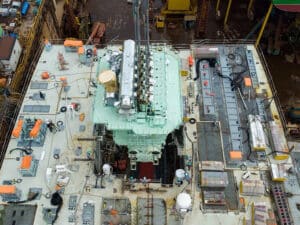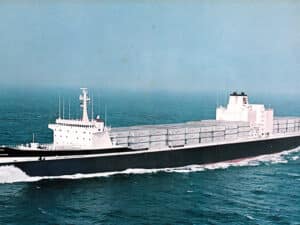
Iran seizes South Korean tanker
Written by Nick Blenkey
FARS News Agency tweeted this image of the tanker apparently under escort by IRGC vessels
Tensions are ratcheting up in the Middle East as Iran’s Islamic Revolution Guards Corps announced that it had stopped a South Korean-flagged ship “for environmental pollution in the Persian Gulf,” adding that the ship has been taken to a port in Southern Iran.
“The South Korean tanker was stopped in the waters of the Persian Gulf environmental pollution and after neglecting warnings,” the IRGC Navy said, according to Iran’s state-controlled FARS News Agency, noting that the tanker had been taken to Iran’s port of Bandar Abbas for further action.
“The tanker, Hankuk Chemi, carrying 7,200 tons of oil chemicals had been violating environmental protocols repeatedly since it set off from the Saudi Al-Jobail port,” the IRGC Navy said, saying the case would now be referred to the Iranian judiciary.
Korea’s Yonhap News Agency reports an official at the operator of the ship, DM Shipping as saying that the Iranian authorities contacted the vessel as it sailed in high seas and that there was no pollution.
Yonhap quotes South Korea’s foreign ministry as confirming that the ship was moving towards Iranian waters and that South Korea’s anti-piracy Cheonghae Unit is moving toward the scene.
In its analysis ot the incident, maritime security specialist Dryad Global notesd that Iranian-South Korean relations have dramatically declined over the last two years, with Tehran expressing hostilities over South Korea’s refusal to release Iranian oil-revenue from South Korean banks. Iranian President Hassan Rouhani has expressed hostilities towards Seoul, labeling their blockage as “… by no means acceptable … we expect Seoul to lift this restriction as soon as possible.”
On December 31, 2020, notes Dryad, a limpet mine was discovered attached to the hull of the Liberian flagged M/T Pola near Iraq’s Al Bakr Oil Terminal.
“The placement of mines and the detention of vessels within the Persian Gulf and Gulf of Oman is activity previously attributed to Iranian forces,” notes Dryad. “The IRGC and wider Iranian forces have a well-established practice of combining both attributable and non-attributable activity to control security narratives in the region. By creating conditions of insecurity, Iran seeks to destabilize existing rules of law and order, challenging the Saudi and American coalitions which militarily control much of the Middle East.”




